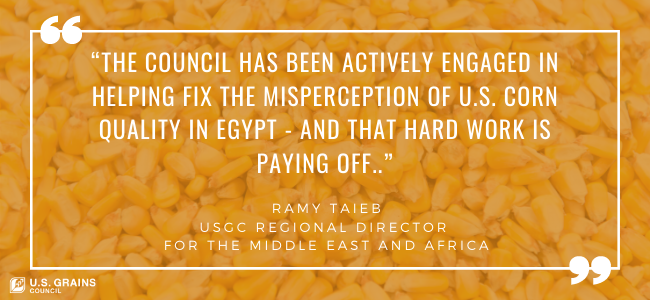U.S. corn made landfall last month at Egypt’s Damietta Port for the first time in two years – a direct result of the U.S. Grains Council’s (USGC’s) efforts to promote practical solutions to address Egyptian corn storage issues.
The 48,551 metric tons (1.91 million bushels) of corn were purchased at the beginning of April, following focused USGC engagement with representatives from large Egyptian grain buying companies that could handle large vessels – combination shipments, specifically – from the United States. The Council helped these importers better understand the infrastructure needed to improve grain monitoring and storage, which will improve the shelf life of U.S. corn when it arrives in Egypt.
“Our engagement in Egypt has been very intense and long-standing,” said Ramy Taieb, USGC regional director for the Middle East and Africa. “The Council has been actively engaged in helping fix the misperception of U.S. corn quality in Egypt, and that hard work is paying off.”
Egypt is the largest coarse grain market in North Africa, with demand constituting 10 million metric tons (nearly 394 million bushels) annually. However, the market is highly competitive as Egypt is the largest market in the region. Ukrainian and Black Sea corn are competitive in this market due to due to spot buying availability, freight advantages and short voyage distances.
Egypt is also a historic buyer of U.S. corn, ranking as the ninth largest corn market in 2018. However, the country has not made purchases since the 2018/2019 marketing year due to competition from both the Black Sea and South America and quality issues for corn in storage in Egypt’s hot and humid climate.
Knowing U.S. corn was facing threats against other origins due to storage challenges at the Egyptian ports, the Council has directly engaged customers’ issues and provided wet feed millers and importers with recommendations on how to better store U.S. corn, including placing portable fans and tubes evenly throughout warehouses, installing exhaust fans in headspaces and keeping detailed records of temperature and moisture content.
The organization also offered a corn conference in July 2019 for the corn wet milling industry to provide additional technical assistance on corn processing and storage. The program helped further educate Egyptian importers on the economic importance of good storage strategies to help ensure grain maintains its value.
“Helping end-users learn how to better monitor and store their grain provides practical solutions to the hot and humid climate conditions in Egypt,” Taieb said. “Technical assistance continues with these importers as they implement these practices and expand purchasing of U.S. corn.”
The Council is also expanding technical assistance into the Egyptian aquaculture market. Recently, two webinars have promoted U.S. distiller’s dried grains with solubles (DDGS) for tilapia diets to the country’s largest feed producers, who are now also milling fish feed.
“Expanding the U.S. market share in Egypt requires strong economic arguments and continued exchanges of technical information,” Taieb said. “By highlighting the value of U.S. corn against other origins, U.S. farmers and agribusiness can reclaim sales to the region’s largest importer.”
About The U.S. Grains Council
The U.S. Grains Council develops export markets for U.S. barley, corn, sorghum and related products including distiller’s dried grains with solubles (DDGS) and ethanol. With full-time presence in 28 locations, the Council operates programs in more than 50 countries and the European Union. The Council believes exports are vital to global economic development and to U.S. agriculture’s profitability. Detailed information about the Council and its programs is online at www.grains.org.

